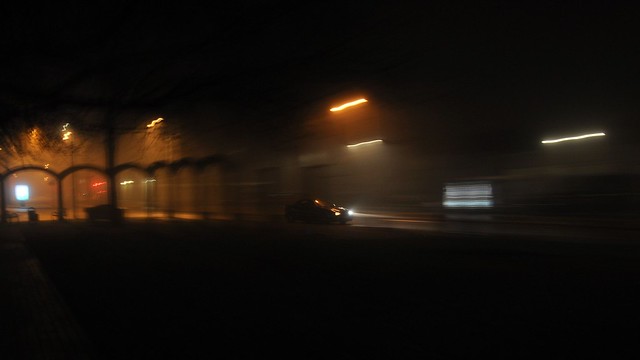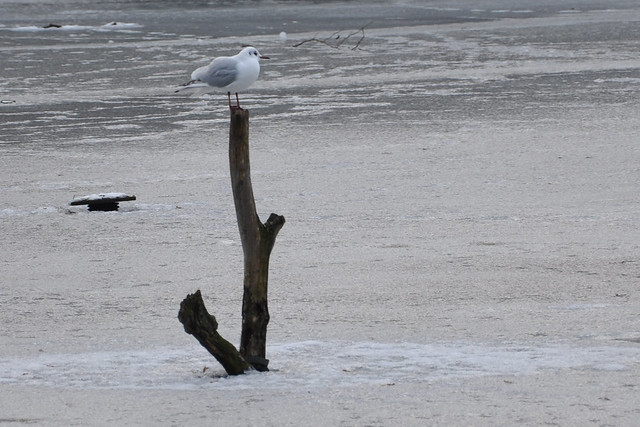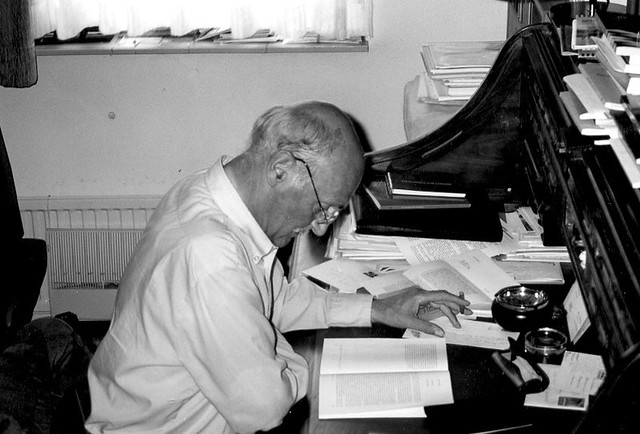Friday, February 25, 2011
Thursday, February 24, 2011
Peter B does PB
Swedish rockstar, sex symbol and freediver extraordinaire Peter Boivie does a personal best Constant Weight No Fins in the Blue Hole, Dahab. He also smashes the Uppsala Club record by 9 meters.
Tuesday, February 22, 2011
normal vs. extreme
One more thing bugged me about this teaser for Breathe:
at 57 seconds into it, they ask Will the question "Do you consider yourself a normal person?" That question is about as loaded as Bill Gates with a .45 Magnum.
There's the aspect of the whole chewed-out 'what is normal?' discussion: what do you base a norm on? You can base it on averages, which for the general public would make Will a superfreak, and by freediving standards still quite exceptional. You can also see a norm as normative, setting the standard, so the highest achievable. In that case Will has set the bar, eh, lower than anyone else, and he is the current norm in CNF. But being the norm is quite abnormal.
Obviously Will is a normal person in that he sleeps and eats (though from the look of it not quite enough cake), he has no gills or fluorescent eyes, he is not 18 feet tall and by all accounts his farts don't smell of baby powder. But he does do extraordinary things. He has dedicated years of his life to do this, which in and of itself is exceptional, and he has worked hard to get where he is. It is, then, quite normal that he is where he is: training yields results, there's nothing new about the story of dedication and perseverance. He didn't just drop down to that 300 feet or the 100 meters, it took him literally thousands of dives.
I think it is normal for a freediver to progress to a point where you're getting deeper than you thought you could when you started freediving, and because of this progression, you get used to the depths and don't consider them extreme anymore. I can see how my friends who don't freedive would think that what i'm doing is extreme,
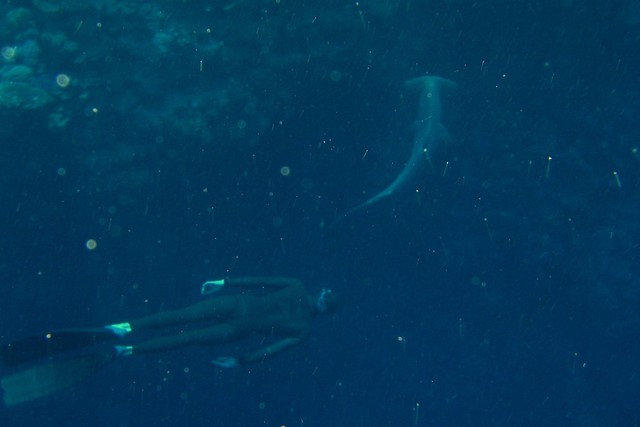
photograph by Erika Schagatay
but among freedivers i'm really quite average. And i've seen enough beginners progress very quickly to know that normal, non-freediving people are just as extreme as were are: people can do extraordinary things, our bodies can handle much more than we think.
That's one of the things that bug me about that question; it doesn't seem to hold into account that normal people with normal bodies are quite capable of doing extreme things. It belittles normality. Another thing that bugs me is how both that question and the 'why risk it?' question seem to be excluding questions: they separate Will from the interviewer and the audience as an abnormality. But i think freediving, much like the Olympic Games, shows what humans are capable of. It is a celebration of human capacities rather than a freak-show. Will is a front-runner in that celebration. The same kind of questions could have been posted to him in an inclusive way, so instead of 'why risk it?' you'd get 'what compels you to go deeper?' and instead of 'do you consider yourself a normal person?' you'd get 'do you consider yourself an extreme person?'
Personally, if they asked me 'do you consider yourself a normal person?' and given the opportunity and means, i would have yelled "Yes!", then socked the interviewer in the nose with an eel while standing on one hand with a Hula-skirt on my head and a pan-fluit up me bum, screaming "I'm Buddha's baby bro and my wee is green!". I doubt Willy will do that, but i'm very much looking forward to seeing his replies this documentary. Two of the questions in the first teaser i find utmost crap, but the interviewer might just be teasing Will. And the imagery in the second teaser is again stunning.
People are quite extreme -maybe extreme is the norm.
at 57 seconds into it, they ask Will the question "Do you consider yourself a normal person?" That question is about as loaded as Bill Gates with a .45 Magnum.
There's the aspect of the whole chewed-out 'what is normal?' discussion: what do you base a norm on? You can base it on averages, which for the general public would make Will a superfreak, and by freediving standards still quite exceptional. You can also see a norm as normative, setting the standard, so the highest achievable. In that case Will has set the bar, eh, lower than anyone else, and he is the current norm in CNF. But being the norm is quite abnormal.
Obviously Will is a normal person in that he sleeps and eats (though from the look of it not quite enough cake), he has no gills or fluorescent eyes, he is not 18 feet tall and by all accounts his farts don't smell of baby powder. But he does do extraordinary things. He has dedicated years of his life to do this, which in and of itself is exceptional, and he has worked hard to get where he is. It is, then, quite normal that he is where he is: training yields results, there's nothing new about the story of dedication and perseverance. He didn't just drop down to that 300 feet or the 100 meters, it took him literally thousands of dives.
I think it is normal for a freediver to progress to a point where you're getting deeper than you thought you could when you started freediving, and because of this progression, you get used to the depths and don't consider them extreme anymore. I can see how my friends who don't freedive would think that what i'm doing is extreme,

photograph by Erika Schagatay
but among freedivers i'm really quite average. And i've seen enough beginners progress very quickly to know that normal, non-freediving people are just as extreme as were are: people can do extraordinary things, our bodies can handle much more than we think.
That's one of the things that bug me about that question; it doesn't seem to hold into account that normal people with normal bodies are quite capable of doing extreme things. It belittles normality. Another thing that bugs me is how both that question and the 'why risk it?' question seem to be excluding questions: they separate Will from the interviewer and the audience as an abnormality. But i think freediving, much like the Olympic Games, shows what humans are capable of. It is a celebration of human capacities rather than a freak-show. Will is a front-runner in that celebration. The same kind of questions could have been posted to him in an inclusive way, so instead of 'why risk it?' you'd get 'what compels you to go deeper?' and instead of 'do you consider yourself a normal person?' you'd get 'do you consider yourself an extreme person?'
Personally, if they asked me 'do you consider yourself a normal person?' and given the opportunity and means, i would have yelled "Yes!", then socked the interviewer in the nose with an eel while standing on one hand with a Hula-skirt on my head and a pan-fluit up me bum, screaming "I'm Buddha's baby bro and my wee is green!". I doubt Willy will do that, but i'm very much looking forward to seeing his replies this documentary. Two of the questions in the first teaser i find utmost crap, but the interviewer might just be teasing Will. And the imagery in the second teaser is again stunning.
People are quite extreme -maybe extreme is the norm.
Sunday, February 20, 2011
'Why risk it?'
This thing has been bugging me for about a month. In the excellent trailer for 'Breathe', the upcoming documentary about William Trubridge, a question is asked. It's at 1:39 in the video below:
At first i thought Will's search for a response was the best part of the teaser, but then i noticed the question tickled me more and more. I wanted Will to come up with bogus answers, like "i dropped my goggles and want them back", or paraphrase George Mallory with "Because it's down there." Now though, i'm at a point where i'm hoping he doesn't answer the question in the documentary at all. It's a crap question.
I understand why the maker of this documentary, Martin Khodabakhshian, had to ask this question, as it is something an outsider would want to know, but it is misguided. Risk implies choice. Asking 'why risk it?' is assuming there are different options, and i don't think there are any options or choices in this matter. I don't dive anywhere near as deep as Willy, but i can't help wanting to dive as deep as i can, and i suspect a lot of freedivers have this. It is an urge to keep falling, to keep dissolving into that pressure, to keep going to that point where only in retrospect you can say that you became one with what you were doing and where you were doing it. It's not about choice or risk, it's about the love of depth.
Depth's reward is intrinsic. It's one of the things that makes freediving so pure. The mere sensations of depth, be it the elephant sitting on your chest when you struggle or the huge hug when you let go, are enough. And of course within that depth you'd want to discover the depth in you, how deep you can go. Isn't that the case with all passion?
We don't choose what we love, just as we don't choose the length of our limbs. We do what we love because we can't help it, we can only surrender to it like we can only surrender to the pressure at depth. The only risk is not doing it. When you don't do what you love, you risk turning into what my dad would call a passionless amorphous mass of banalities. And why risk that?
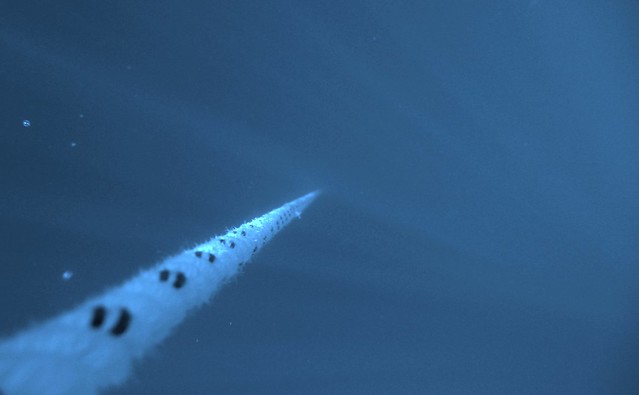
At first i thought Will's search for a response was the best part of the teaser, but then i noticed the question tickled me more and more. I wanted Will to come up with bogus answers, like "i dropped my goggles and want them back", or paraphrase George Mallory with "Because it's down there." Now though, i'm at a point where i'm hoping he doesn't answer the question in the documentary at all. It's a crap question.
I understand why the maker of this documentary, Martin Khodabakhshian, had to ask this question, as it is something an outsider would want to know, but it is misguided. Risk implies choice. Asking 'why risk it?' is assuming there are different options, and i don't think there are any options or choices in this matter. I don't dive anywhere near as deep as Willy, but i can't help wanting to dive as deep as i can, and i suspect a lot of freedivers have this. It is an urge to keep falling, to keep dissolving into that pressure, to keep going to that point where only in retrospect you can say that you became one with what you were doing and where you were doing it. It's not about choice or risk, it's about the love of depth.
Depth's reward is intrinsic. It's one of the things that makes freediving so pure. The mere sensations of depth, be it the elephant sitting on your chest when you struggle or the huge hug when you let go, are enough. And of course within that depth you'd want to discover the depth in you, how deep you can go. Isn't that the case with all passion?
We don't choose what we love, just as we don't choose the length of our limbs. We do what we love because we can't help it, we can only surrender to it like we can only surrender to the pressure at depth. The only risk is not doing it. When you don't do what you love, you risk turning into what my dad would call a passionless amorphous mass of banalities. And why risk that?

Saturday, February 19, 2011
Wednesday, February 16, 2011
Tuesday, February 15, 2011
Friday, February 11, 2011
Tuesday, February 8, 2011
the light of spring
I heard today that springtime is on average 17 days earlier than it used to be, and this year they're even expecting it 3 weeks sooner. Now i'm not sure how they measure the arrival of spring -i'm assuming that march 21st hasn't moved that much, though it would be funny if March 3rd was now followed by the 21st instead of the 4th- but i measure it by the light, and for the last 2 days, we've had spring.
But don't peg me on it

This guy was basking in it too
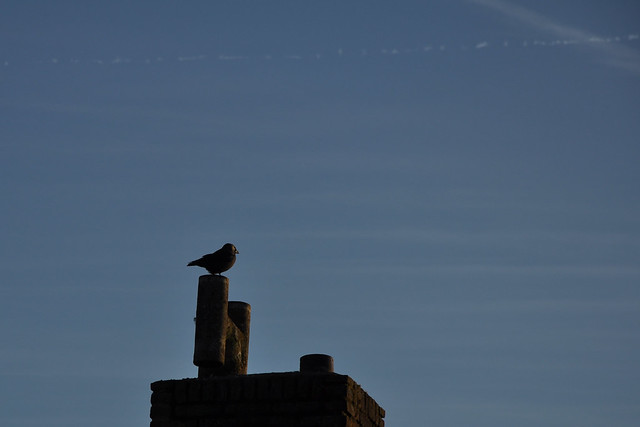
as was this one was riding high on it
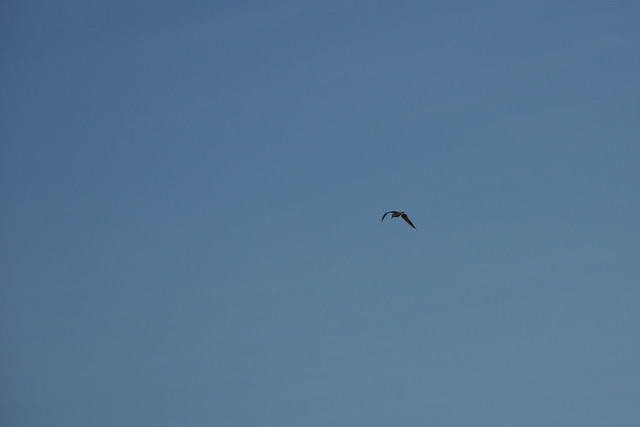
and even these buggers were early with their dance
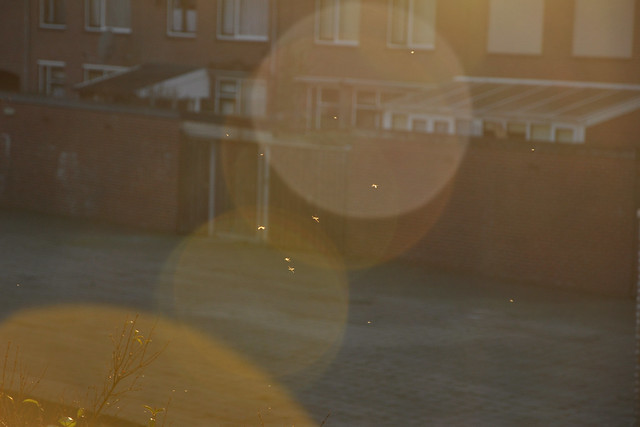
But don't peg me on it

This guy was basking in it too

as was this one was riding high on it

and even these buggers were early with their dance

Monday, February 7, 2011
Spirituality, by Cornelis Verhoeven
Spirituality
With the word 'spirituality' i still
involuntarily think of monasteries or congregations and of the subtle
differences that used to exist between them. For that is the context
in which i've gotten to know the word. There was for example a
benedictine, a dominican and a franciscan spirituality. That way of
ecclesiastical life or that mentality could be more or less described
by experts and even in its effects be read on faces, but it was
mostly a matter of empathy and inner kindredness. I never got really
far into that myself, but i think i remember that 'redemptorists' had
a somewhat creaky voice and strong-willed chins because of their high
collars. But despite those odd memories the word 'spirituality' has
remained extraordinarily dear to me and the value of spirituality has
never become the object of any skepticism. For it has to do with the
characteristic of being 'spiritual' and therefore isn't completely
dictated by things that are material, worldly and fashionable, but
more by an interest of matters of the mind -to put it solemnly. With
that comes firstly the refusal to deduce those matters to more
superficial affairs. In which way and within which tradition a person
is spiritual is then already much less relevant and i assume that
there is little interest for it outside of the convents.
Why the word had been used so little
for a while i couldn't say with certainty, but it is possible that it
is related to the fact that it used to be connected to some
explicitly religious and clerical associations. Lots of people seem
to have become allergic to that. Despite that, for the last couple of
years i've been seeing the word more often and it seems as though the
religious pressure has been lifted off of it. It still fits very well
for religious affairs, but it looks as though a spiritual dimension
has been discovered outside of religion, for example in austerity, a
culture in which the environment is spared and the destructive
tendencies of commercialism and consumption are acknowledged. But
what was predictable, has in the meantime happened: for spirituality
too a market was discovered. And if there's one thing that isn't
spiritual, it is a market. The word will therefore probably not be
around for long, even when different brands of spirituality start
competing, like they did in the old days. In this situation
spirituality can show how resistant it is. If it turns out not to be,
it will rightfully be discarded as one of the uncountable fashions
that are based solely on imitation and have no content of their own.
Then it would have to start again as a hidden, inner life.
Austerity as a spiritual attitude and a
characteristic of a spiritual life has long been preached, perhaps
solely to justify a poverty that was considered inevitable. In a time
of poverty it then becomes almost something suspect, but in times of
plenty it gets the chance to become a style of living that cannot
simply be reduced to a lack of fat and vitamins. Spirituality, from
my point of view, is mostly a matter of style, and style is at its
best when it is a voluntary restriction of available means, therefore
a form of austerity. The new spirituality has possibly risen from a
resistance to a style-less submission to the dumb fat and wallowing
in consumptive abundance. For this abundance feeds an insatiable
gluttony and develops into a form of poverty to which there is no
end. Spirituality represents the style that can limit this.
~ Cornelis Verhoeven

~ Cornelis Verhoeven

Saturday, February 5, 2011
Wednesday, February 2, 2011
Cornelis Verhoeven, Attention
He would have turned 83 today. I miss him.
Attention
In his book 'The interior of reality'
Marc Schabracq says something about attention that struck me. Namely
that he doesn't connect it to the pricking up of the ears, like we
see in dogs, but to the aiming of the eye to a certain point; and he
thinks this is a purposeful process. At the base of this there
appears to be a goal-oriented selection from the multitude of things
that are detectable to our eyes and ears within the bandwidth to
which our perceptions are limited. For we can't see everything that
in principle is visible nor prick our ears up to what we can't hear.
I quote a short extract: “In everyday life attention is a
purposeful process. (...) We don't just take notice of something and
we don't just divide the world into separate events and objects. The
object of our attention represents for us a meaning that can have
consequences in the light of our own goals and actions.” What is
important in this description seems to me the presumption that the
initiative for attention comes from the observer himself and not from
eye-catching affairs that unconsciously draw our attention by
alarming or fascinating us.
It seems unmistakable to me that
attention always has this ordering function or serves it, but i doubt
whether it's always so purposefully and actively chosen and used as a
means. Within the wait or watchfulness that is attention, there is
also always room for the unexpected that as object of attention
remains undetermined. And the way we usually use the word doesn't
exclude, but more so seems to imply, that attention isn't our own
product or an act of our will, but that it is being caught from
outside and forced by something that strikes us because of its own
importance, without any special effort on our part. Attention can
also ambush us and be forced upon us. The object of our chosen
attention can be shoved aside by something else that distracts us
from the first attention. The effect of that is that our own image of
the whole doesn't become more clear, but is instead disturbed. We can
no longer make heads or tails of it and the necessity of a completely
different and no less temporary order of the whole can suddenly
present itself. In attention as a form of wonder things loose their
obviousness and ask for a new appraisal.
Attention is, i think, not an
instrument we can wield at will. For practical life, in which we with
a certain stubbornness -also a form of attention- strive for our own
goals, this can have some drawbacks. It seems more like
absent-mindedness than like concentration. But for a contemplative
frame of mind or a way of thinking that isn't directly geared towards
a product, this change of perspective can be very fascinating and
given some time even very fertile. It is that mostly because pretty
much every different perspective leads to new insights. Or, to put it
in less relative terms, attention, produced from within or dictated
from outside, is always rewarding. Reality owes a lot of its meaning
to being the object of concentrated and dedicated attention. Things
apparently thrive with a form of attention in which they are allowed
to be present and not be neglected.
~ Cornelis Verhoeven
Tuesday, February 1, 2011
Free Immersion
"And for a while i was half skin half breath"
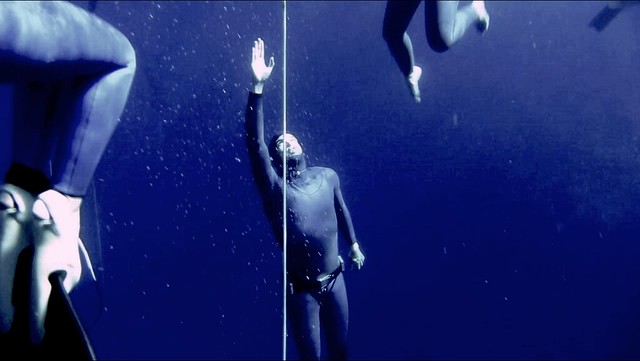
Without this training dive, and more specifically, the advice of Nanja van den Broek afterwards, i could have never done my record the next day.
Poem by Alice Oswald found in her marvelous book 'Weeds and Wild Flowers'.

Without this training dive, and more specifically, the advice of Nanja van den Broek afterwards, i could have never done my record the next day.
Poem by Alice Oswald found in her marvelous book 'Weeds and Wild Flowers'.
Subscribe to:
Comments (Atom)
